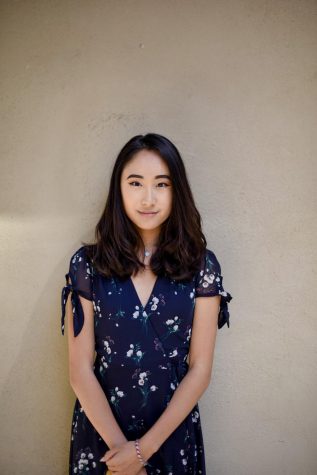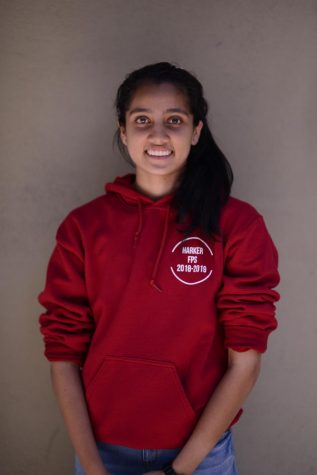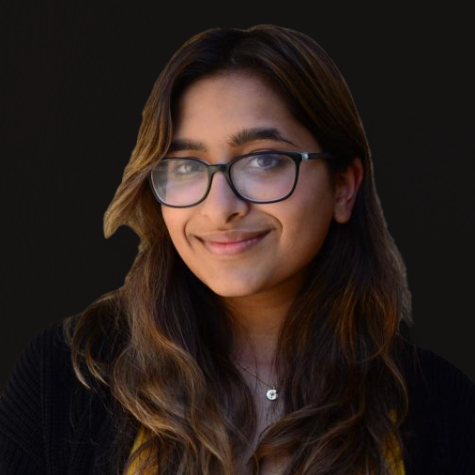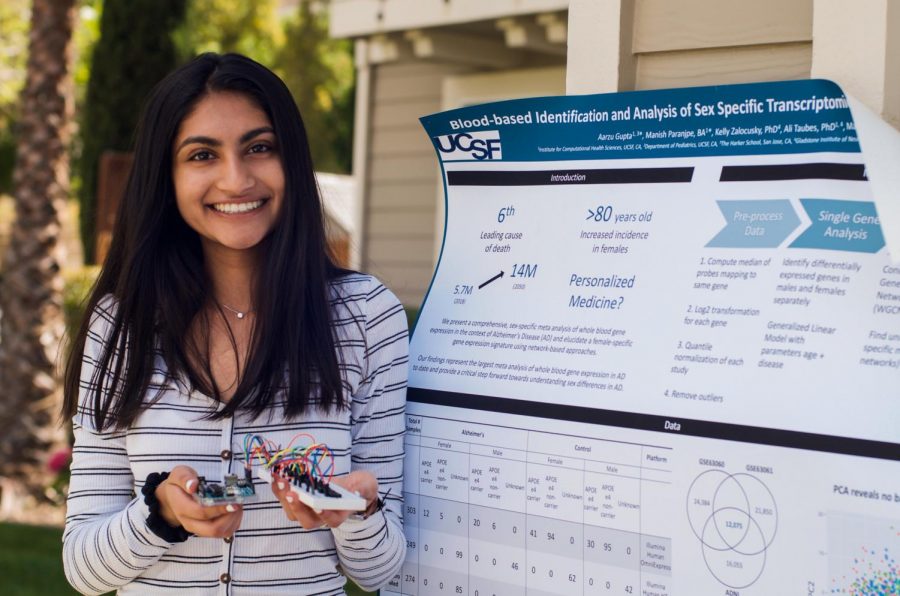Humans of Harker: Story of a STEMinist
Aarzu Gupta (’20) bridges the gender gap in STEM fields through education and research
“My ability to adjust to these situations by readily adapting and optimizing the outcome of the unpredictable led to superior outcomes and taught me the power of flexibility and open-mindedness. The unknown used to terrify me, but I have learned to recognize, appreciate and find comfort in unplanned spaces. Rather than remaining married to my plans, I have gained trust in myself to think creatively on the spot and in others,” Aarzu Gupta (’20) said.
Aarzu Gupta’s (‘20) journey into the world of coding began on the other side of the fence: in art. Specifically, with a digital turtle who could draw upon command.
In elementary school, Aarzu, who attended Challenger School at the time, was introduced to computer science through the program Terrapin Logo, which allowed students to direct a virtual turtle to draw using lines of code.
This program sparked Aarzu’s fascination with the power of computer science to create something tangible, like art. After Aarzu’s early endeavors with Terrapin Logo, she was inspired to continue taking classes and summer camps in subjects such as artificial intelligence and HTML web design, expanding her interests in coding.
Aarzu’s experience with coding as an art form has since shaped her approach to computer science, engineering and STEM fields as a whole. As a singer since she was five years old as well as an avid Bollywood dancer and performer, Aarzu has also found new ways of incorporating art into computer science, especially through music.
Now, as a veteran coding student, Aarzu seeks to find creative ways not only to bring music and art into her own coding work but also to encourage young girls like herself to explore STEM fields at an early age.
“The integration of art with these other fields is something that I was very engaged with earlier on, and that led my interest into these fields,” she said. “For many girls, it’s something that they’re very familiar and comfortable with, whether it be playing an instrument, just listening to music, singing or dancing. And so I thought if I found a way to combine that with these other fields that perhaps they don’t know that much about, they would show interest in the first place and potentially find a way to get more engaged.”
In 2018, Aarzu’s desire to share her art-based approach to coding led to the foundation of MusiCodes, an education program that aims to foster youth interest in STEM fields by using music to teach coding.
Aarzu, one of MusiCodes’ two co-founders, was particularly motivated to start this program because of the gender gap in STEM education.
In fact, as early as middle school, Aarzu became aware of not only the disparity between the number of boys and the number of girls who were in her programming classes, but also the difference in their early exposure to basic technical coding and engineering skills.
“Basic games and toys that toddlers are exposed to, that puts an implicit bias in their heads that just gives girls less exposure, in general, to even the most basics of these fields—not coding in general, just like simply being with like a screen or a laptop for a long time,” Aarzu said, citing Minecraft and Legos in particular as traditional examples of male-dominated games for children.
Aarzu has felt the impacts of the disparity in exposure in her personal experiences. When Aarzu attended a summer camp at the Tech Museum in middle school to learn how to make iOS games, she noticed that out of the 30 or 40 students in her classes, there were only five girls. She recalls that because many of her male peers had prior coding and gaming experience due to their familiarity with popular video games like Minecraft, she and her female peers felt like they “didn’t have enough knowledge” and like they were “a little bit behind when it came to this.”
With MusiCodes, Aarzu hopes to bridge the gender gap in STEM fields and bring more female students into computer science earlier on through the marriage of coding and music, which she notes attracts “a pretty universal interest” among young boys and girls alike.
“It’s not very gendered, boys and girls can like listening to music,” Aarzu said. “The integration of [music into coding] helps even out the playing field.”
Two years after MusiCodes’ founding, Aarzu and the other student leaders have expanded the program to be open to all genders and students from all backgrounds, especially those from schools with fewer resources to teach computer science. These students can participate in workshops with MusiCodes in which they learn how to code and build their own working keyboard, a process that allows students to experience a rewarding feeling of using coding to build something tangible—the same feeling that first drew Aarzu into computer science and engineering.
“Rather than just having kids type up stuff and see a program online, they get to type up something and see a physical result of what they’re making,” Aarzu said. “The hands-on part is what’s super engaging, especially at a young age, and that was the case for me as well.”
Aarzu’s passion for bridging the gender gap in STEM has shaped her academic work as well. As the president of WiSTEM, a club that promotes female representation in STEM fields, for the past two years, Aarzu has organized panels, workshops, the STEM Buddies program with lower school students, and fundraisers for WISER, a nonprofit organization that funds schooling and healthcare for girls in rural Kenya—all with the goal of addressing and educating her peers about the gender gap in STEM.
The dedication that Aarzu brings to her interests does not go unnoticed by her peers, some of whom have been inspired by Aarzu’s work ethic, as Nikhita “Niki” Karra (‘20), Aarzu’s friend of four years, notes.
“She works really, really hard, and I really respect that about her. She is really dedicated to the things that she does and things that she likes, and it’s really nice to see that in her,” Niki said. “I’ve learned so much from watching her.”
A prospective biomedical engineering major, Aarzu has also focused her own research on overlooked medical fields in women’s health issues. For the past two years, Aarzu has worked with medical researcher and professor Dr. Marina Sirota at the University of California at San Francisco on a software project that aims to explore gender differences in Alzheimer’s disease and detect biomarkers to diagnose Alzheimer’s disease.
Throughout her research with Dr. Sirota, Aarzu has found that research in female-centric fields receives considerably less funding and attention in spite of the necessity for such research. For instance, even though women are more likely at risk of having Alzheimer’s disease than men, current diagnostic and therapeutic research does not take that into account.
“It’s very evident that female research, in general, doesn’t get enough attention. It definitely should,” Aarzu said. “Part of what I want to do in the future is to continue working like in this path of finding ways to give more attention and finding ways to research more into problems that could specifically be affecting females or where there is a difference but that has not been very specifically stated.”
Through her work, Aarzu strives to not only elevate women’s issues to the forefront of societal attention but also lift up her peers in the process. From MusiCodes to WiSTEM, Aarzu’s leadership has created spaces that encourage learning, curiosity and creativity among her fellow students.
“She’s a force. If you’re ever working with her or involved in something she does, she’s a big force, and she’ll motivate everybody around her. And she’ll just create this environment where it’s like, you want to work more too because her passion and her energy, it just brings about that,” said Nik Sridhar, a recent graduate of Saratoga High School and Aarzu’s close friend. “That’s the biggest impact that she leaves. I mean, of course, she’s creative, and she’s smart—that’s given. But I think especially her energy and just the environment she creates for other people, it’s inspiring.”
One of Aarzu’s key takeaways from her work in STEM education and research is to respond to unexpected obstacles with an open mind. From the myriad of unplanned challenges that arose while launching the first MusiCodes workshops, Aarzu has learned to approach bumps in the road as opportunities to debug and improve, adapting a core skill in coding to her life overall.
“My ability to adjust to these situations by readily adapting and optimizing the outcome of the unpredictable led to superior outcomes and taught me the power of flexibility and open-mindedness,” Aarzu said. “The unknown used to terrify me, but I have learned to recognize, appreciate and find comfort in unplanned spaces. Rather than remaining married to my plans, I have gained trust in myself to think creatively on the spot and in others.”
Above all, Aarzu’s ability to take problems, like the gender gap in STEM, and transform them into learning opportunities both for herself and for others has inspired others to do the same, including Aarzu’s older sister Anika Gupta (‘14).
“I continue to learn from her by example. Even though she’s younger than me, she often has very logical responses to situations that I think people my age and even older can be somewhat baffled by,” Anika said. “As much as I like to think that I can try to teach her from my life experiences, I really do feel like just watching how she handles difficult situations and how she handles new opportunities and how she creates them for herself has been really eye-opening for me and encourages me and inspires me to also work on those attributes for myself.”
Additional reporting by Saloni Shah.

Kathy Fang (12) is the editor-in-chief of Harker Aquila. This is her fourth year on staff. From covering local marches and protests to initiating Harker...

Saloni Shah (12) is the editor-in-chief of Humans of Harker. This is her fourth year on staff. She loves to spend time with the rest of the staff and...

Esha Gohil (12) is the co-editor-in-chief of Humans of Harker and the photo editor of Harker Aquila. This is her fourth year on staff, and this year she...




![LALC Vice President of External Affairs Raeanne Li (11) explains the International Phonetic Alphabet to attendees. "We decided to have more fun topics this year instead of just talking about the same things every year so our older members can also [enjoy],” Raeanne said.](https://harkeraquila.com/wp-content/uploads/2025/10/DSC_4627-1200x795.jpg)


















![“[Building nerf blasters] became this outlet of creativity for me that hasn't been matched by anything else. The process [of] making a build complete to your desire is such a painstakingly difficult process, but I've had to learn from [the skills needed from] soldering to proper painting. There's so many different options for everything, if you think about it, it exists. The best part is [that] if it doesn't exist, you can build it yourself," Ishaan Parate said.](https://harkeraquila.com/wp-content/uploads/2022/08/DSC_8149-900x604.jpg)




![“When I came into high school, I was ready to be a follower. But DECA was a game changer for me. It helped me overcome my fear of public speaking, and it's played such a major role in who I've become today. To be able to successfully lead a chapter of 150 students, an officer team and be one of the upperclassmen I once really admired is something I'm [really] proud of,” Anvitha Tummala ('21) said.](https://harkeraquila.com/wp-content/uploads/2021/07/Screen-Shot-2021-07-25-at-9.50.05-AM-900x594.png)







![“I think getting up in the morning and having a sense of purpose [is exciting]. I think without a certain amount of drive, life is kind of obsolete and mundane, and I think having that every single day is what makes each day unique and kind of makes life exciting,” Neymika Jain (12) said.](https://harkeraquila.com/wp-content/uploads/2017/06/Screen-Shot-2017-06-03-at-4.54.16-PM.png)








![“My slogan is ‘slow feet, don’t eat, and I’m hungry.’ You need to run fast to get where you are–you aren't going to get those championships if you aren't fast,” Angel Cervantes (12) said. “I want to do well in school on my tests and in track and win championships for my team. I live by that, [and] I can do that anywhere: in the classroom or on the field.”](https://harkeraquila.com/wp-content/uploads/2018/06/DSC5146-900x601.jpg)
![“[Volleyball has] taught me how to fall correctly, and another thing it taught is that you don’t have to be the best at something to be good at it. If you just hit the ball in a smart way, then it still scores points and you’re good at it. You could be a background player and still make a much bigger impact on the team than you would think,” Anya Gert (’20) said.](https://harkeraquila.com/wp-content/uploads/2020/06/AnnaGert_JinTuan_HoHPhotoEdited-600x900.jpeg)

![“I'm not nearly there yet, but [my confidence has] definitely been getting better since I was pretty shy and timid coming into Harker my freshman year. I know that there's a lot of people that are really confident in what they do, and I really admire them. Everyone's so driven and that has really pushed me to kind of try to find my own place in high school and be more confident,” Alyssa Huang (’20) said.](https://harkeraquila.com/wp-content/uploads/2020/06/AlyssaHuang_EmilyChen_HoHPhoto-900x749.jpeg)



